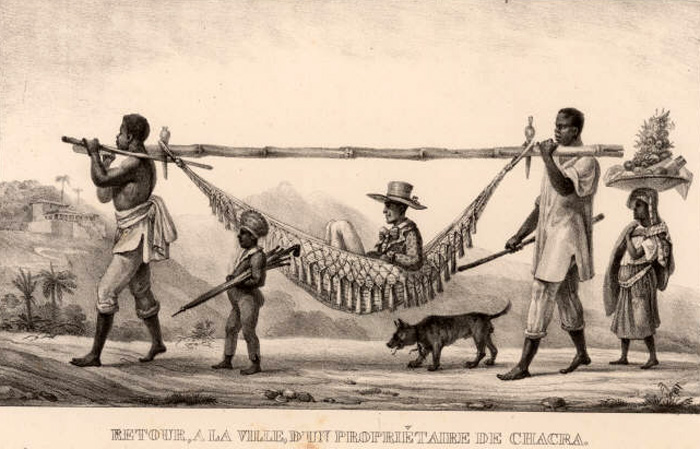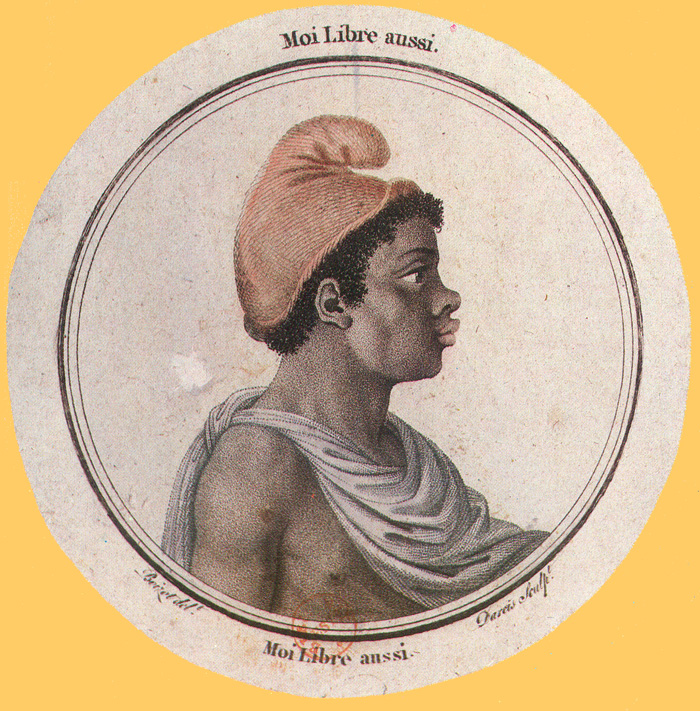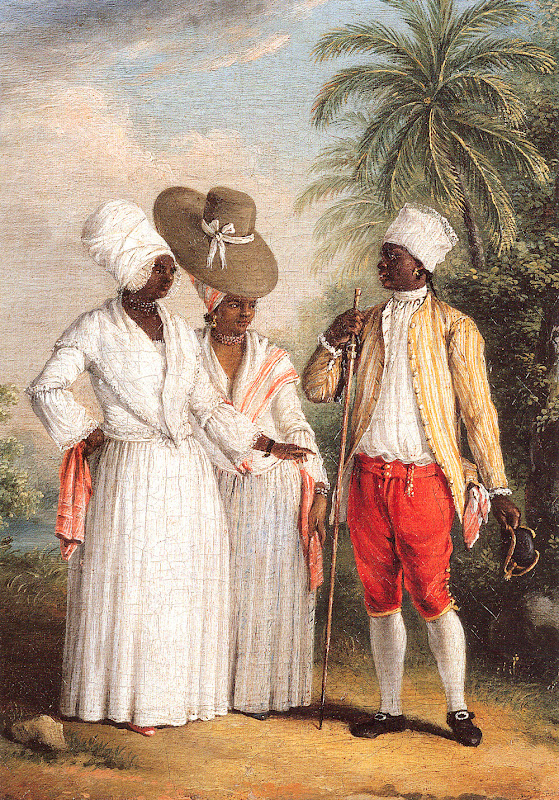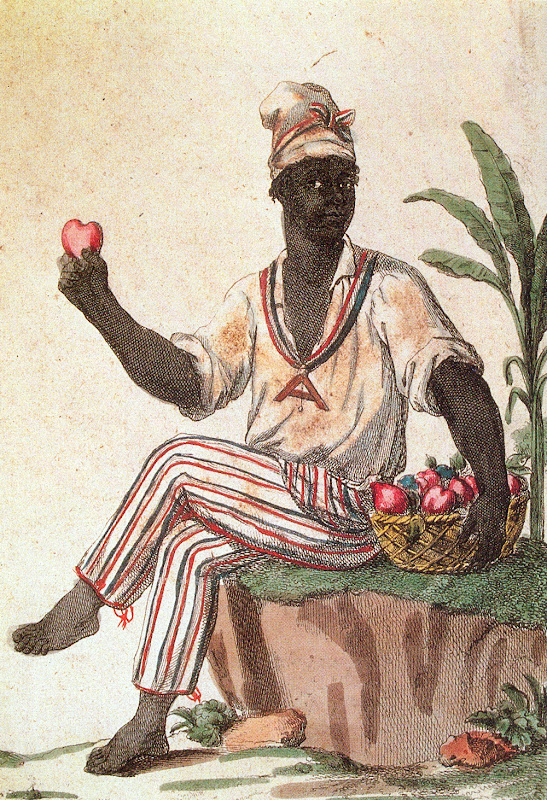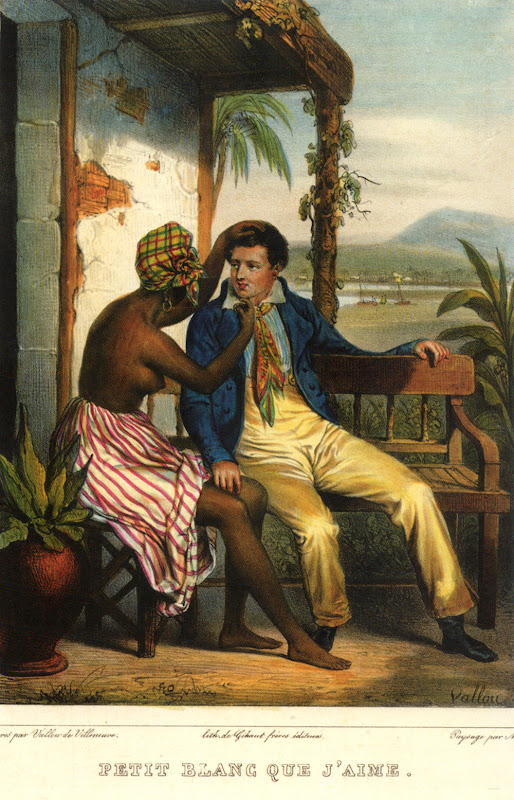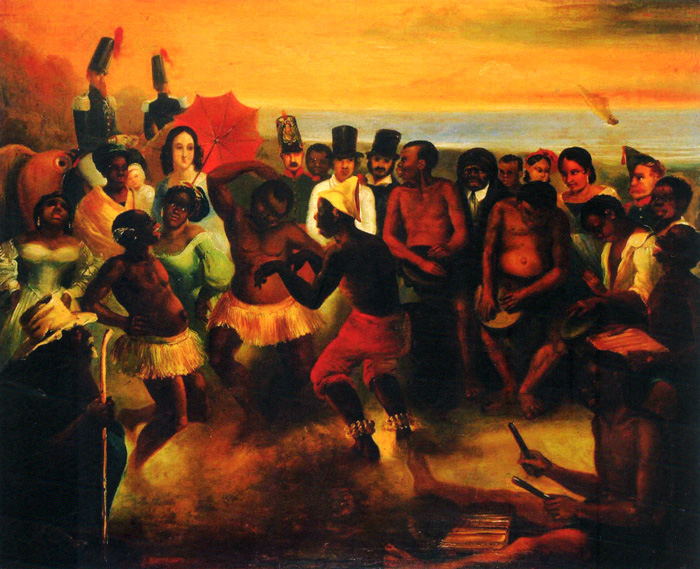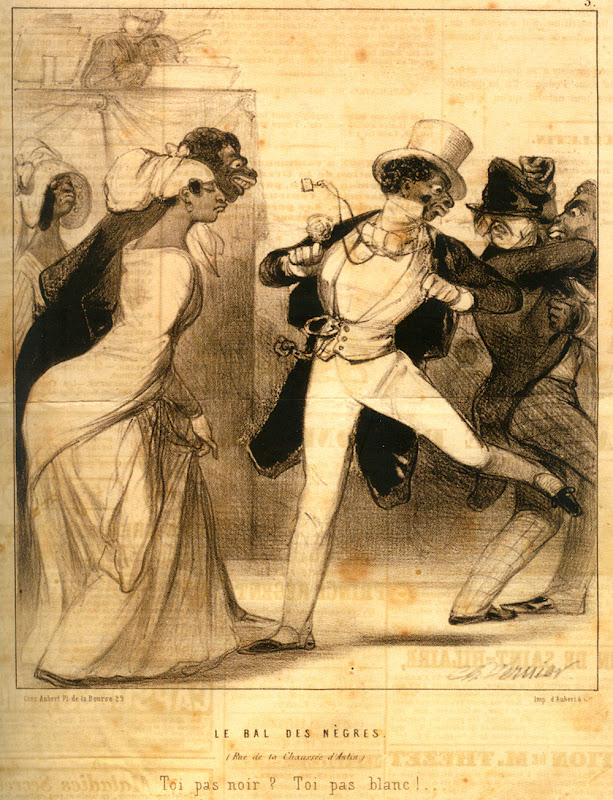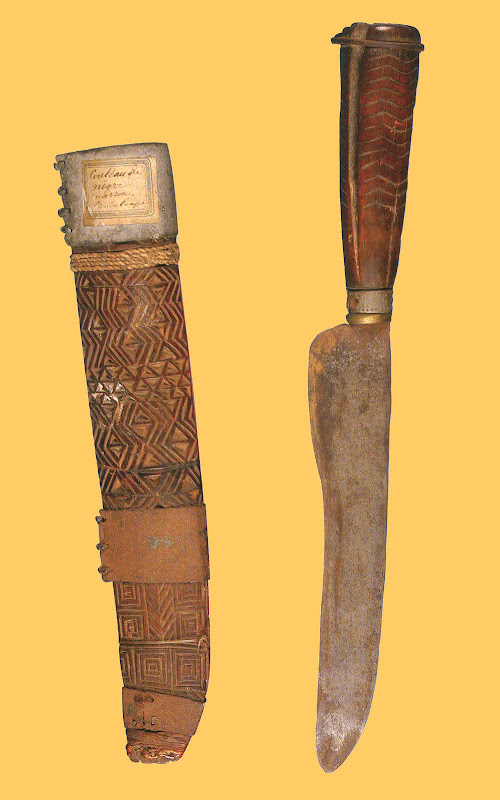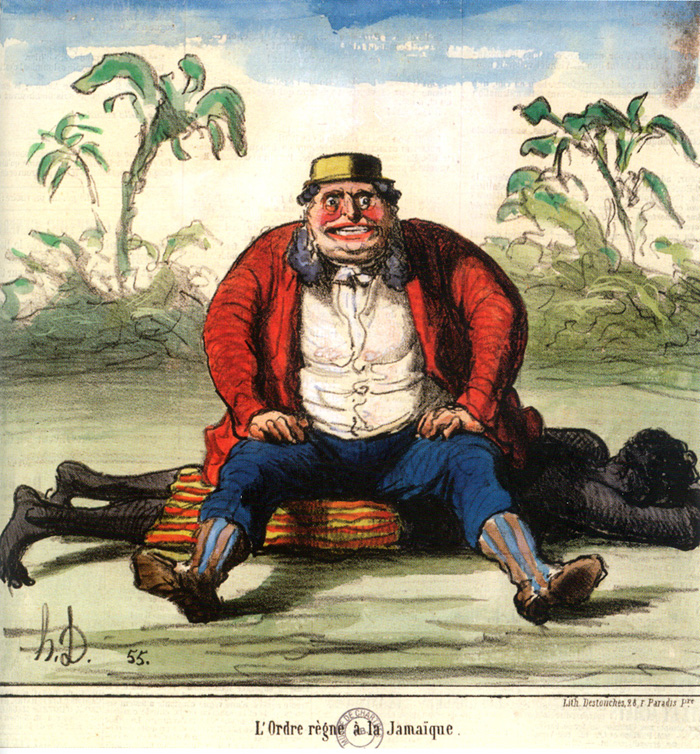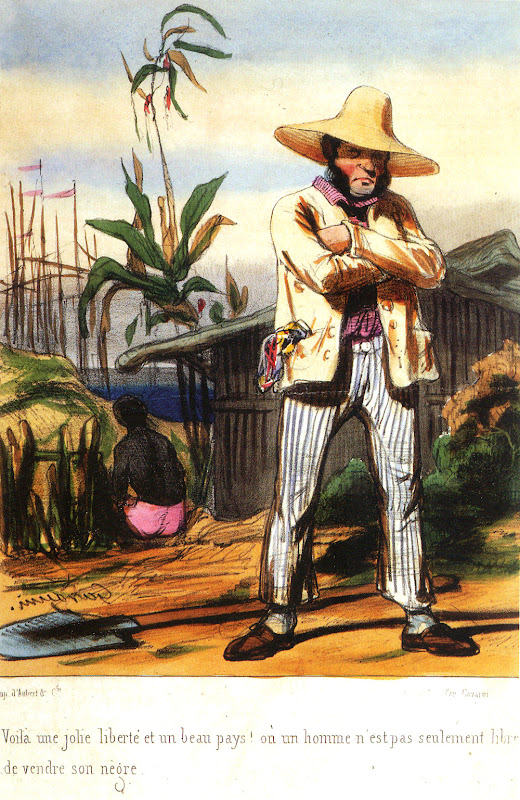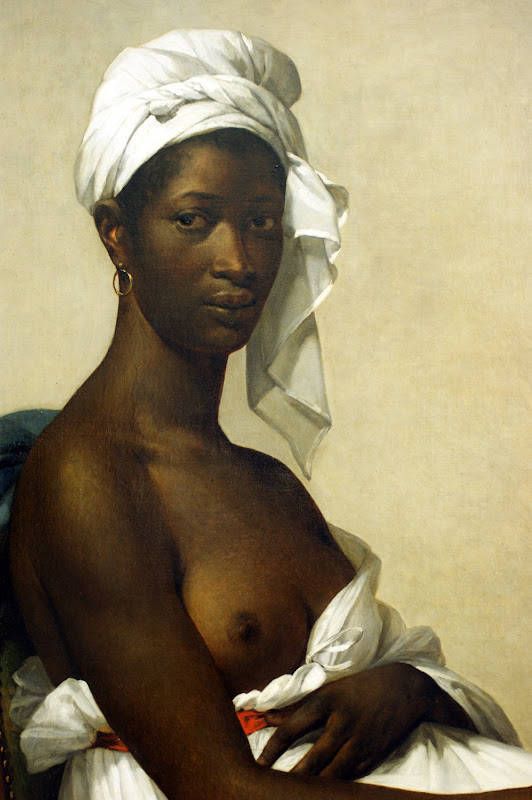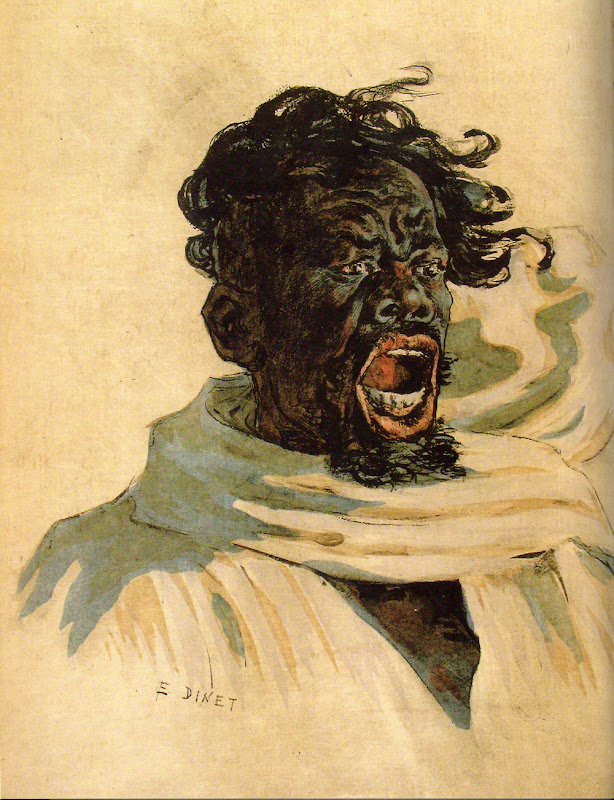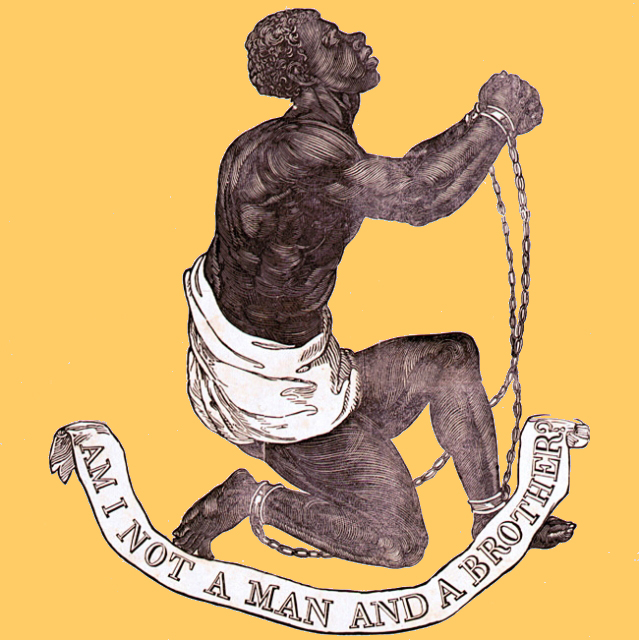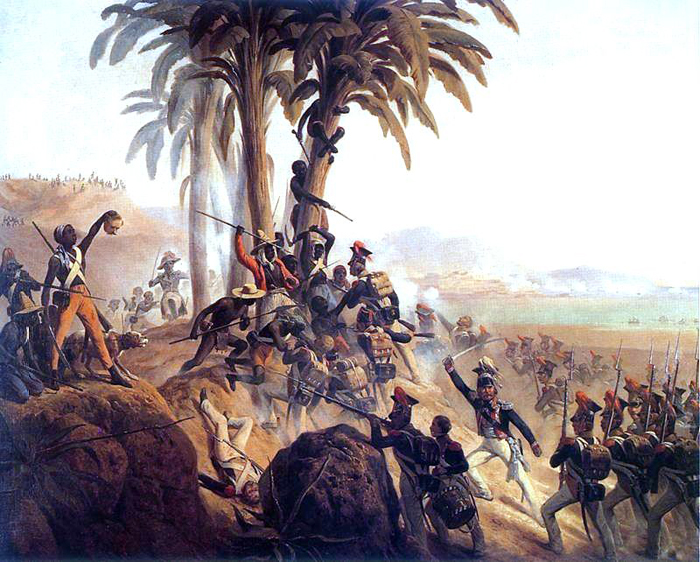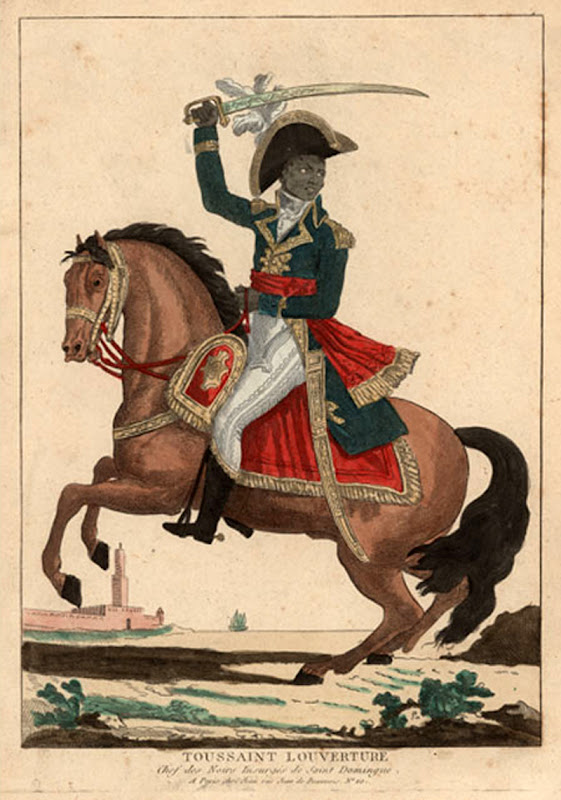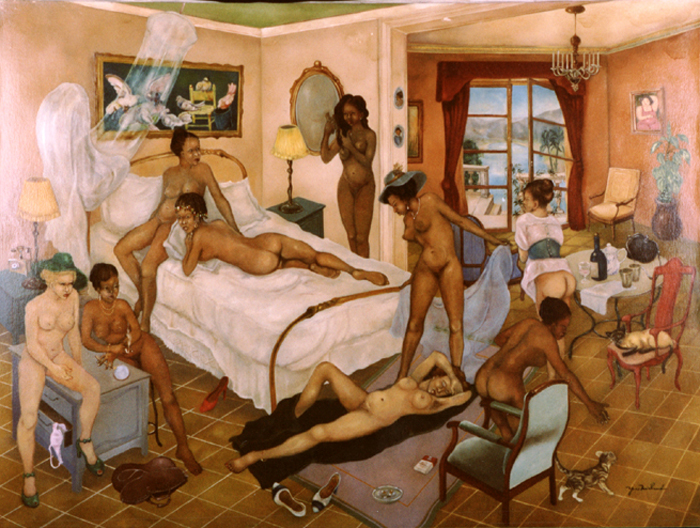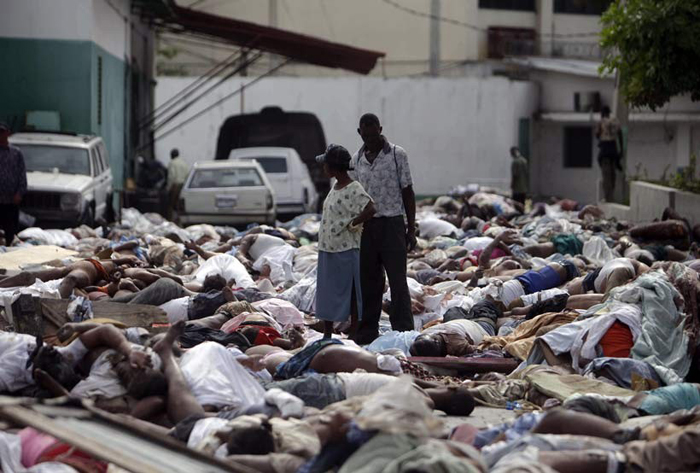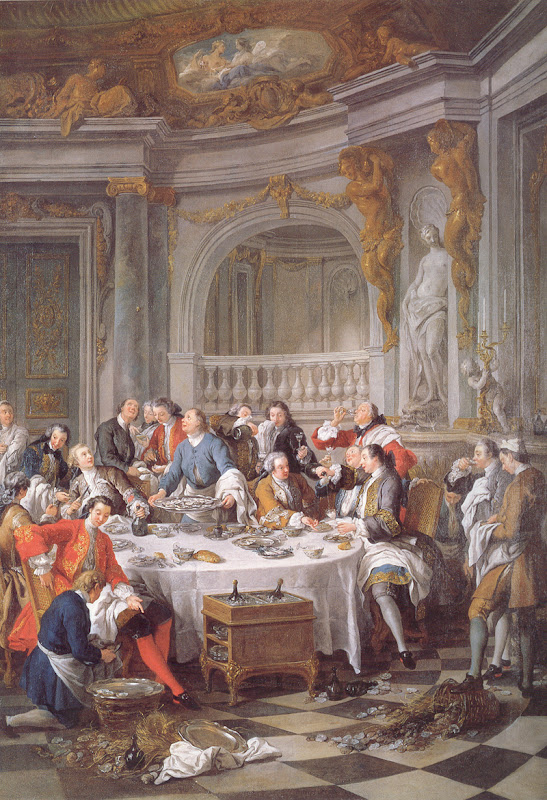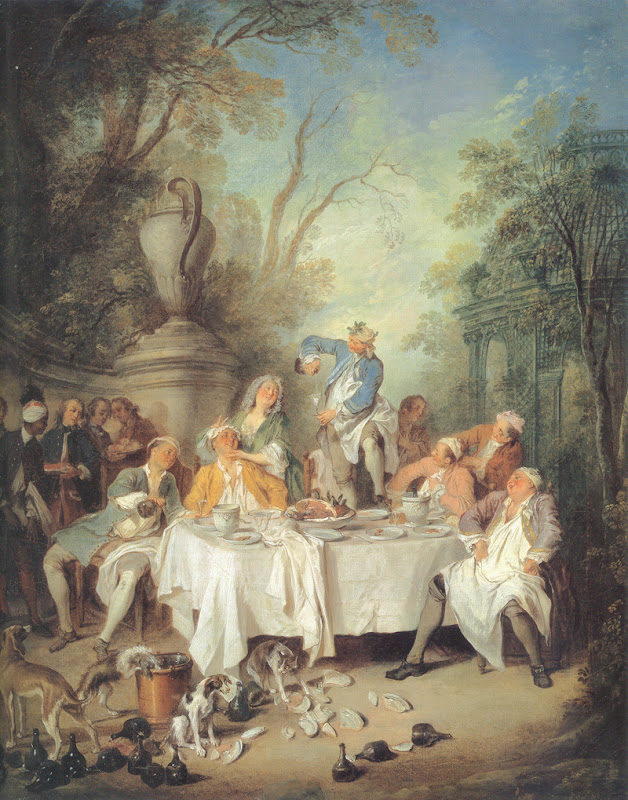"Pearl" of the Caribbean ... C e Friday, January 15, 2010, at 8:40 on i -TV, Eric Woeth, budget minister, refused to agree to pay a single cent to the Republic Haiti's ... before being organized an "international conference" by "several weeks" ...
"It's been 10 years since we accumulate disaster but it looks like a coup de grace as if an underground power had decided to remove from the world map. " Jean-Claude Bajeux , director of the Ecumenical Center for Human Rights, in Port-au-Prince. January 2010
Ti-Jean Sandor
I am Little John Sandor
I am Prince Sandor
I'm a cock-foot-end
I Ti-Jean foot-dry
boom my heart I
On top of a palm
I serve both hands
I walk backwards
arms crossed in the back
I burst before me
loads of powder
I leave behind me
wake of a long chain
I change My West Point cadet
In a beautiful dog breed
What I bite the ear
I am a big eater
In white dogs I
A bull at one hundred seeds
I change my student at Yale
In boiler with three legs
I bakoulou-baka
[...]
Hatred never leaves my bones
Neither my blood or my skin
Even when I sleep at night
His black star opens me
Eyes that are claws
If they let me go after
In my night of gall I lierai
My muscles to those of Cyclone
And earthquakes
To swallow this bitter South
And we opened another South
In side of my Africa
Haine O my great health
I plunge my temples burning
In the blue ice from your waves
I plunge my people naked
In this proud current lustral
I plunge our tigers our spears
Our wounds our cries our thirsts
Our feathered our knives tears
In this whirlwind holy water
And here we are forever baptized
All black convicts the world
We are finally ripe
To give our plots
great white wings
As orgies of hatred
At the heart of white South!
Rene Depestre , Arc-en-ciel for the Christian West 1967
Josiah Wedgwood (1730-1795) is among others the author of the abolitionist medallion represented iste nt a slave in chains:
Am I Not A Man and A Brother? The sentence was translated by the Friends of Blacks (Lafayette, Condorcet, and Claviere, Brissot ...) by " Am I not your brother? . Josiah Wedgwood was himself an ardent abolitionist ist.
At the eve of the French Revolution, the French colony of Saint Domingue, Haiti future, is of unparalleled prosperity. It is the world's largest producer of sugar - more than half of production - such as coffee. Its foreign trade accounts for more than a third of that of metropolitan France. A French in eight lives directly or indirectly. This opulence is built on an economic system and social organization criticized inhumane. On the eve of the French Revolution, the slave population there is 500 000 30 000 persons against whites, themselves often of low birth ... Only a small elite composed of wealthy planters, or great whites from the nobility or the bourgeoisie of the big business, led the crowd of petty officials, employees and workers, called small white and a multitude of slaves, on the eve of the Revolution are more than 30,000 each year to land on the island. The average life expectancy of these, regarded as "property" from the C ode Black does not exceed ten years ...
raised since August 1791, the inhabitants of the French part of the island of Santo Domingo (Hispaniola former and future Haiti ...), including a majority of slaves, will fight, the cost of thousands of deaths, particularly under the leadership of Toussaint L'Ouverture (1746-1803), until the abolition of slavery in 1793 and proclaim the independence of the island on 1 January 1804, despite an attempt to regain control and restoration of slavery by a resolution of N. Bonaparte in 1802 and 1803, and the deportation and death of Toussaint L'Ouverture in 1803 ...
"Battle of the ridge to Pierrot", 1802
ON BEHALF OF THE FRENCH PEOPLE, Bonaparte, First Consul, Republic Act PROCLAIMS the following decree, issued by the legislative body on 30 Floreal, An X [1802], as proposed by the Government on the 27th of that month, provided the Tribunate the same day.
ORDER.
ART. I.er In the colonies returned to France under the Treaty of Amiens, 6 Germinal, An X, slavery will continue in accordance with the laws and regulations prior to 1789.
II. It will be the same in other French colonies beyond the Cape of Good Hope.
III. The slave trade and importation into the said colonies, will be held in accordance with laws and regulations existans before that time in 1789.
IV. Notwithstanding any previous laws, the regime of colonies is submitted, for ten years, the regulations which will be made by the Government.
Collated with the original, by our president and secretary of the legislative body. In Paris, 30th Floreal, year X of the French Republic. Signed the young Rabaut, President; Thiry, BERGIER, Tupinier, Rigal, secretaries.
IS this Act under the seal of the state, inserted Bulletin of the statutes, registered in the records of judicial and administrative authorities and the Minister of Justice responsible for monitoring the publication. In Paris, 10 Prairial year X of the Republic.
Signed: Bonaparte, First Consul. Cons-signed, the secretary of state, HUGH B. Maret. And the seal of the state.
Vu, the Minister of Justice, signed ABRIAL.
January Suchodolski i (1797-1875); The Battle of Saint-Domingue
Haiti, after bloody wars that have seen thousands die of his children, proclaimed on 1 January 1804 its independence. These wars have ravaged the plantations, destroyed infrastructure, eliminated the intelligentsia and leaders who can work in the construction of the Haitian nation in the post colonial era. " However, Haiti, in spite of France, becomes the first Black Republic in the history ...
January 1, 1804
PROCLAMATION TO THE NATION
General Chief of the People of Haiti
citizens
It is not enough to have expelled from your country the barbarians who have bloodied the past two centuries, it is not enough have put a stop to factional ever-recurring which in turn played the phantom of liberty that France exposed to your eyes: we must, by a last act of national authority, assure forever the empire of liberty in the country that we were born ;; must delight in inhumane government that takes our minds for a long time in the most humiliating torpor, all hope of réasservir we must at last live independent or die.
Independence or death ... that we align these sacred words, and they are fighting and the signal of our meeting.
Citizens, my countrymen, I gathered in this solemn day these courageous soldiers who gather on the eve of the last breath of freedom, have lavished their blood to save her, and these general that guided your efforts against tyranny have not yet done enough for your happiness ... French name mournful yet our country.
All recounts the memory of the cruelties of this barbarian people: our laws, our customs, our cities, but still bears the imprint French; what am I saying? there are French in our island, and you believe that free and independent republic which fought all nations, it is true, but never defeated those who wanted to be free.
What! victims over fourteen years of our gullibility and our indulgence, not defeated by the French armies, but by the pathetic eloquence of the proclamation of their agents: when we get tired of breathing the same air they? What have we in common with these people executioner? His cruelty compared moderation in our patient, color as ours, the extent of the seas that separate us, our vengeful climate, tell us plainly that they are not our brothers, they will never achieve, and if they are an asylum among us, they will still be the machinations of our troubles and our divisions.
indigenous citizens, men, women, girls and kids, wear your eye on all parts of the island, looking ahead, you, your wives, you, your husbands and you, your brothers, you, your sisters, what am I saying? Looking to your children, your children at the breast, what are they now? ... I shudder to say ... the prey of these vultures.
Instead of these interesting victims, your eye perceives dismayed that their murderers that tigers still dripping blood, and whose horrible presence you reproach your insensibility and your slowness to avenge them guilty. What do you expect to soothe their souls? Remember that you wished that your remains rest beside those of your fathers, when you hunted tyranny; you descend into their tombs without having avenged? No! their bones grow back your own.
And you, precious men, intrepid generals, who, indifferent to your own misfortunes, have resurrected liberty by lavishing all your blood, know that you did nothing, if you do not give nations a terrible example, but just for vengeance to be exercised by a people proud to have regained his freedom and jealous to maintain it; alarming that anyone would dare try to rob us again, let us begin by the French ... They tremble in addressing our shores, if not by the recollection of the cruelties they have performed, at least by the terrible resolution that we will take to devote to death anyone born French sully his sacrilegious foot the territory of freedom .
We dared to be free, dare to be by ourselves and for ourselves. Imitate the growing child: his own weight breaks the edge that it becomes useless and the obstacles in his way. What nation has fought for us? what people would reap the fruits of our labors? And what dishonorable absurdity than to vanquish to be slaves. Slaves! ... Let the French this qualifying epithet: they have vanquished to cease to be free.
Walk on other tracks, which imitate these people, carrying their solicitude till about the future and dreading to leave to posterity the example of cowardice, preferred be exterminated only scratched the number of free peoples.
Let us, however, that the spirit of proselytism does not destroy our work; let our neighbors breath in peace, they live peacefully under the aegis of the laws they have made and will not, firebrand revolutionaries, we criminalizing legislators Caribbean, to include our glory to disturb the rest of the islands are close to us and they did not, like the one we inhabit, was sprinkled with the innocent blood of their inhabitants, they have no vengeance to exercise against the authority that protects them.
Happy have never known the ideals that we have destroyed, they can only do our best wishes for prosperity.
Peace to our neighbors, but anathema to the French name, eternal hatred to France: this is our cry.
natives of Haiti! my fortunate destiny reserved me to be one day the sentinel who had to ensure the custody of the idol to which you sacrifice, I have watched, fought sometimes alone, and if I was lucky enough to call into your hands the sacred trust that you gave me, remember that it is now to keep it. Fighting for your freedom, I worked on my own happiness. Before the consolidation by laws that ensure free your individuality, your leaders, which I assemble here, and myself, we owe you the last proof of our dedication.
Generals, and you leaders, gathered here near me for the happiness of our country, the day has come, this day should perpetuate our glory, our independence.
If it could exist among us a warm heart, he walks away and tremble to pronounce the oath that must unite us. Swear to the entire universe, to posterity, to ourselves, to renounce forever to France and to die rather than live under its domination until the last breath to fight for the Independence of our country.
And you, unfortunate people too long, witness the oath that we speak, remember that it is on your perseverance and your courage that I counted when I launched the career of freedom in order to combat the despotism and tyranny against which you struggled for 14 years. Remember that I sacrificed everything to fly to your defense: parents, children, fortune, and now I'm richer than your freedom, that my name has become a horror to all people who want the slavery, and that the despots and tyrants do not pronounce that, cursing the day I was born, and if ever you refused or received while murmuring the laws that the genius that ensures your destiny will dictate me for your happiness you deserve the fate of ungrateful peoples. But away from me this horrible idea; you will support the freedom that you cherish and support the leader who command you. So ready in my hands the oath to live free and independent, and prefer death to anything that would tend to put you under the yoke. Finally swears to continue forever the traitors and enemies of your independence.
Done headquarters of Gonaïves, January 1 million eight hundred and-four, l year of Independence.
Signed: JJ DESSALINES
ACT OF INDEPENDENCE
Indigenous Army
Today, I January 1804, the Commander in Chief of the native army, accompanied by army generals, summoned for the purpose of taking measures tending to the happiness of the country;
After having made known to the assembled generals his true intentions to ensure never natives of Haiti a stable government, the object of his deepest solicitude, which he did by a speech which tends to make known to foreign powers The resolution to make the country independent, and enjoy the liberty consecrated by the blood of the people of this island, and after obtaining the opinion, requested that each of the assembled generals to pronounce a vow never to abandon the France, to die rather than live under his rule, and fight till the last gasp for Independence.
The generals, imbued with these sacred principles, after giving a unanimous voice their commitment to a well manifested project of independence, have all sworn to posterity, to the Universe to renounce forever to France, and to die rather than live under its domination.
Made in Gonaives, l January 1804 and the first of the Independence of Haiti.
Signed: Dessalines, the general in chief, Christophe, Petion, Clervaux, Geffrard Vernet Gabart, major generals, P. Romano, E. Gerin, F. Capoix, Daut, JL Francis, Férou Cange, L. Bazelais, Magloire Ambroise, JJ Herne, Toussaint Brave, Yayou, brigadier generals, Bonnet, F. Papalia, Morelly, Knight, Marion, adjutant-general; Magny, Roux, chief brigade Charéron, B. Loret, Qenez, Makajoux, Dupuis, Carbon, Diaquoi elder Raphael Mallet Derenoncourt, army officers, and Boisrond Thunder, Secretary.
PROCLAMATION OF GENERAL
On behalf of the People of Haiti
We generals and army chiefs of the island of Hayti, thankful for the blessings we have experienced-in-chief Jean-Jacques Dessalines, the protector freedom enjoyed by the people, the name of freedom, on behalf of Independence, on behalf of the people he made happy, we proclaim the Governor General for life on the island of Hayti, we swear to blindly obey the laws emanating from its authority, the only one we recognize, we give him the right to peace, war, to appoint his successor.
Done headquarters of Gonaïves, January 1, 1804, 1st Independence Day.
Signed: Gabart, P. Roman, JJ Herne Capoix, Christopher, Geffrard, E. Gerin, Vernet, Petion, Clervaux, JL Francis, Cange, Férou Yayou, Toussaint Brave, Magloire Ambroise, L. Bazelais.
... Throughout the 19th century, many loans were made. These loans were used to build a nation newly liberated from the yoke of slavery and ravaged by war, have only served to strengthen the power of domination of the bourgeois classes. This is the time of the "international conspiracy" by the colonial powers who saw in the independence of Haiti a bad example for other colonies. Haiti was isolated from the rest of the world. She had to borrow money from the colonial powers to pay the debt of independence. The consequences of this denigration by the "great powers" are felt until today.
In 1825, then burst in on the day after the evils of war and the disadvantaged, the notament small farmers, struggling to enjoy the rights for which they had fought the French king, Charles X, requires the Haitian government of Jean Pierre Boyer, the payment of a sum equivalent to 150 million gold francs (U.S. $ 30 million ).
CHARLES, by the grace of God, King of France and Navarre, to all present and future, hello.
Considering Articles 14 and 73 of the Charter;
Wanting to assure that claims the benefit of French commerce, the misfortunes of former colonists in Santo Domingo, and the precarious state of the current inhabitants of this island;
We ordered and ordain as follows:
Art. 1. Ports of the French part of Santo Domingo will open trade with all nations.
The fees in these ports or on ships or on the goods, both at entry and exit will be equal and uniform for all flags except the French flag, for which these rights will be halved.
Art. 2. The current inhabitants of the French part of Santo Domingo will contribute to the fund Federal Deposit France, in five installments from year to year, the first term due December 31, 1825, one hundred fifty million francs, intended to compensate the former settlers who claim compensation.
Art. 3. We concede to these conditions by this Order, the current inhabitants of the French part of Santo Domingo, independence full of their government.
And this order will be the great seal.
Given at Paris at the Tuileries, April 17 in the year of grace 1825, and our first rule.
General Toussaint Louverture
April 17, 1825, the order of King Charles X of France recognizes the independence of the so former colony against a "compensation independence "under pain of a new French occupation (... France had sent for this purpose a fleet of 14 military vessels off the coast of the island ...). Since 1814, the party Haitian (President Petion) had proposed this transaction with France to obtain formal recognition, and secure the independence proclaimed in 1804 ... (at this large sum could be used to repair the damage caused by years of war to build schools for the education of thousands of children, provide services adequate health care to the population, etc. ...). Indeed, virtually no country has recognized the independence on that date.
Yves Michaud ; Girls Anna , 1992
Indemnity, we said, is estimated at a negotiated amount of initial 150 million francs, which will be reduced to 90 million in 1838, the Haitian authorities will eventually pay in 1886, after 61 years ... This money was intended to compensate French settlers for their lost properties. But only 11,000 of over 25,000 persons compensated are former colonists. The others are heirs to whom the French banks seek reimbursement of loans to their parents for the purchase of land and slaves. This will then finally the French banks to be the main beneficiaries of this odious blackmail.
Cliché anonymous January 2010
These are the Haitian exports to the year 1823 that are served basis. 30 million gold francs 15 million have been subtracted for the costs of production. He then applied a traditional French property valuation to 10 years of net operating income, 150 million. At that time it was observed that this was the only total exports of the colony in 1789. It also seems that the Haitian government relied on a wealth of 250 million amassed by King Christophe, and the performance of gold mines in the eastern part of the island that had just been occupied. But exports were declining, only 10 million treasury Christophe were recovered, and gold mines were found dead. Moreover, the surplus of the country was very low, as acknowledged by the lending banks of the Haitian State (bank Laffite ...)
Master Greg ory Bull, January 2010
It is estimated that this is the heavy burden of debt which led in 1910 to purchase a significant portion of the Bank of the Republic Haiti by the U.S. bank National City . An operation that will the prelude to the American occupation of the island from 1915 to 1934. It is indeed a complaint of non-repayment of debts from U.S. banks that formally initiated the transaction.
Cliché anonymous January 2010
It should be noted that the United States has used the pretext of the Haitian agreement on the payment of allowance to maintain their refusal to recognize the State of Haiti. A position that is related to racial prejudice against blacks at the time, and the new Monroe Doctrine . It was only in 1862 that the U.S. will recognize Haiti. This decision under the presidency of Abraham Lincoln coincides with his Emancipation Proclamation which ended slavery in the United States.
Cliché, Juan Barreto, January 2010
April 7, 2003, in conjunction with street demonstrations of the Lavalas movement who chanted "Restitisyon", the President Aristide asks the restoration by France of the independence allowance. He believes the discounted amount to about 20 billion Euros. On June 2, 2003 President Jacques Chirac says "I the greatest sympathy for the country and its people. And we have additional, significant cooperation in Haiti and we bring substantial help. Before evoke litigation of this nature, I would urge Haitian authorities to be very vigilant about, I would say, criminal and anti-democratic actions and their regime . Following the departure of Aristide in February 2004, the new Prime Minister Gerard Latortue says abandon this request ...


